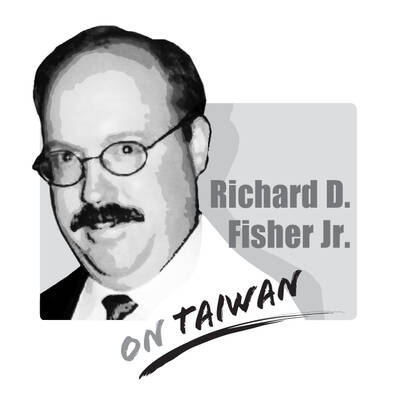Nicaragua dealt a blow to Taiwan and the US when it switched diplomatic recognition from Taipei to Beijing, but it also created an opportunity for Taiwan to recalibrate its foreign policy.
Nicaraguan President Daniel Ortega’s government on Thursday declared it was severing relations with Taipei and said that Taiwan is an inalienable part of China. Ortega in 1985 also cut ties with Taiwan, although his successor, Violeta Barrios Torres de Chamorro, resumed recognition in 1990.
The announcement caught Taipei somewhat off-guard, as the government over the past few weeks had seemed more worried about maintaining ties with Honduras. For the US, it appeared as a direct challenge, as it coincided with US President Joe Biden’s Summit for Democracy, attended by Taiwan and other countries virtually.
In criticizing Managua’s switch, the US Department of State pointed to Ortega’s victory in last month’s “sham election.”
“Without the mandate that comes with a free and fair election, Ortega’s actions cannot reflect the will of the Nicaraguan people, who continue to struggle for democracy and the ability to exercise their human rights and fundamental freedom,” department spokesman Ned Price said in a statement.
Following the election, the US Department of the Treasury’s Office of Foreign Assets Control imposed sanctions against the Nicaraguan Public Ministry and nine government officials.
Although China’s influence in Central America cannot be overlooked, Nicaragua’s shift this time epitomized Washington’s disagreements with its neighbors in the region.
The change also came as the Ministry of Foreign Affairs in Taipei hosted a 43-person delegation from Slovakia that ended their five-day visit on Friday. On the eve of their departure, the delegation expressed keen interest in deepening bilateral cooperation in cutting-edge industries, such as semiconductors, electric vehicles and space technology.
A delegation of lawmakers from Estonia, Latvia and Lithuania left Taiwan last week after visiting the economic and science ministries and attending the Open Parliament Forum in Taipei. Their visit is part of a new wave of support from central and eastern Europe, after Czech Senate President Milos Vystrcil led an 89-person delegation to Taiwan in August last year.
The visits illustrate a sharp contrast: While Taiwan is being snubbed by developing countries for political reasons, it is attracting more suitors from Europe due to its technological prowess and success in curbing COVID-19.
“It is not bad to save a lot of money,” Taipei Mayor Ko Wen-je (柯文哲) said yesterday, when asked about the breakup with Nicaragua. His remarks betray the mentality of most Taiwanese who are indifferent to losing one more diplomatic ally.
The Financial Times on Friday reported that President Tsai Ing-wen (蔡英文) had promised to lend Nicaragua US$100 million prior to its election, but Taiwanese banks refused for fear of contravening US sanctions against the Central American country. The Ministry of Foreign Affairs denied the report, saying that the government in February 2019 agreed to provide a US$100 million commercial loan to Nicaragua to help with reconstruction following anti-government demonstrations in 2018.
A relationship can be sustainable only if it is mutually beneficial. Taiwan might be a political dwarf on the global stage, but it is a giant in technology that no country can overlook. Instead of struggling to maintain ties with unreliable partners, the government should allocate more funds to promoting “technological diplomacy.” It is more worthwhile to bolster ties with countries that are friendly and can be complementary with Taiwan in national developments.
A series of strong earthquakes in Hualien County not only caused severe damage in Taiwan, but also revealed that China’s power has permeated everywhere. A Taiwanese woman posted on the Internet that she found clips of the earthquake — which were recorded by the security camera in her home — on the Chinese social media platform Xiaohongshu. It is spine-chilling that the problem might be because the security camera was manufactured in China. China has widely collected information, infringed upon public privacy and raised information security threats through various social media platforms, as well as telecommunication and security equipment. Several former TikTok employees revealed

The bird flu outbreak at US dairy farms keeps finding alarming new ways to surprise scientists. Last week, the US Department of Agriculture (USDA) confirmed that H5N1 is spreading not just from birds to herds, but among cows. Meanwhile, media reports say that an unknown number of cows are asymptomatic. Although the risk to humans is still low, it is clear that far more work needs to be done to get a handle on the reach of the virus and how it is being transmitted. That would require the USDA and the Centers for Disease Control and Prevention (CDC) to get

For the incoming Administration of President-elect William Lai (賴清德), successfully deterring a Chinese Communist Party (CCP) attack or invasion of democratic Taiwan over his four-year term would be a clear victory. But it could also be a curse, because during those four years the CCP’s People’s Liberation Army (PLA) will grow far stronger. As such, increased vigilance in Washington and Taipei will be needed to ensure that already multiplying CCP threat trends don’t overwhelm Taiwan, the United States, and their democratic allies. One CCP attempt to overwhelm was announced on April 19, 2024, namely that the PLA had erred in combining major missions
On April 11, Japanese Prime Minister Fumio Kishida delivered a speech at a joint meeting of the US Congress in Washington, in which he said that “China’s current external stance and military actions present an unprecedented and the greatest strategic challenge … to the peace and stability of the international community.” Kishida emphasized Japan’s role as “the US’ closest ally.” “The international order that the US worked for generations to build is facing new challenges,” Kishida said. “I understand it is a heavy burden to carry such hopes on your shoulders,” he said. “Japan is already standing shoulder to shoulder